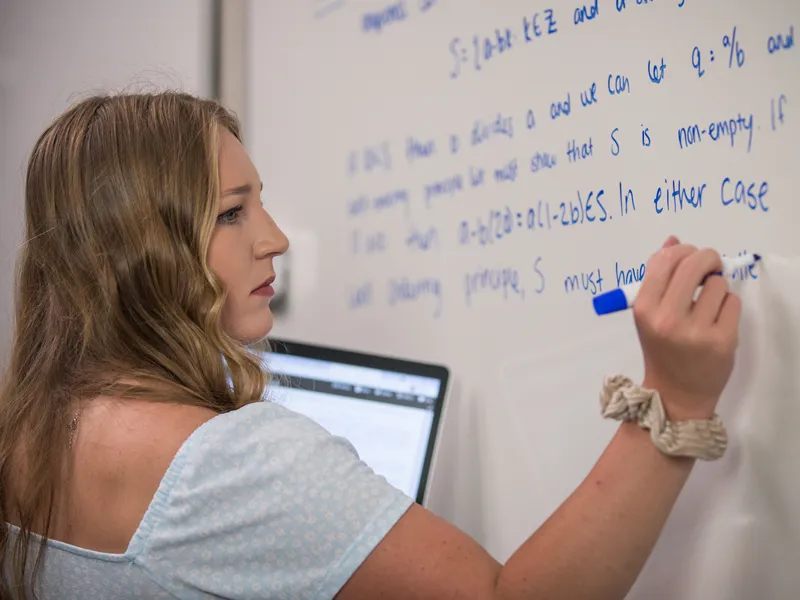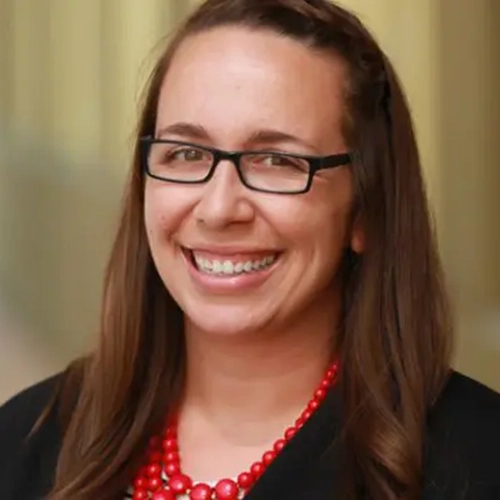
Mathematics
Bachelor of Arts
Jessup’s Bachelor of Arts in Mathematics will prepare you to serve in the marketplace in a wide range of fields including business, education, science, and engineering. In addition to developing strong logical, analytical, and computational skills, this program seeks to model Christian maturity and guide students as they discover the glory of God revealed through mathematics.
About the Program
The mathematics major provides students with a fundamental foundation in mathematics, preparing them for further study or for careers in education or a wide spectrum of industry. The purpose of the Department of Mathematics is to support the vision and mission of Jessup by equipping its students with quantitative and analytical skills necessary to lead and serve in an increasingly technological world.
Assessment of student outcomes are accomplished primarily through a senior portfolio—a compilation of work from throughout their Jessup experience. The completed portfolio is the final product of the senior seminar class. This seminar serves as the capstone class for the degree and gives students the opportunity to demonstrate verbal and written communication skills, research mathematical topics of interest, and prepare for future employment or advanced studies in mathematics.
Program Courses
- Major Courses (9 units)
- MATH140 | Calculus I
- PHYS102/L | University Physics I with Lab
- Core Courses (44 units)
- MATH120 | Statistics
- MATH141 | Calculus II
- MATH210 | Linear Algebra
- MATH241 | Differential Equations
- MATH242 | Calculus III
- MATH300 | History of Mathematics and Number Theory
- MATH301 | Introduction to Mathematical Proof
- MATH320 | Probability Theory
- MATH410 | Abstract Algebra
- MATH461 | Real Analysis
- MATH498 | Senior Seminar
- CSCI151 | Programming I
- Math Electives (Choose six units from below)
- MATH305 | Discrete Mathematics
- MATH350 | Modern Geometry
- MATH460 | Complex Analysis
- MATH462 | Numerical Analysis
- MATH499 | Topics in Mathematics
To view all courses and course descriptions, please see our current Academic Catalog.
Mathematics Minor Courses – General (20-21 units)
- MATH140 | Calculus I (MATH140)*
- *Note that Calculus I (MATH140) fulfills the general education mathematics requirement.
- MATH141 | Calculus II
- MATH210 | Linear Algebra
- MATH301 | Introduction to Mathematical Proof
- Two additional MATH courses, at least one of which is at the 300 level or higher (6-7 units)
- (Consult with the Mathematics department for recommendations.)
Mathematics Minor Courses – For CSCI Majors (20 units)
- MATH141 | Calculus II
- MATH210 | Linear Algebra
- MATH242 | Calculus III
- MATH301 | Introduction to Mathematical Proof
- Two additional MATH courses, at least one of which is at the 300 level or higher (6 units)
- (Consult with the Mathematics department for recommendations.)
To view all courses and course descriptions, please see our current Academic Catalog.
The following list of private fee based tutors is provided as a service for students, and should not be interpreted as an endorsement or recommendation by the Jessup University Mathematics Department. Check with each individual tutor for their prices, qualifications and style of tutoring. If you are a math major or minor and wish to be listed as a private tutor, please contact Bradley Wagner.
Tutors
- Tanner Daugherty – Student
P: (530) 210-0058
E: tdaug7@gmail.com
Topics: up to Calculus 2 - Alex Fok – Student
P: (279) 900-9139
E: thisisalexfok@gmail.com
Topics: up to Calculus 2 and Statistics - Heriberto Espinosa
P: (916) 807-7055
E: es.heriberto@gmail.com
Topics: up through Calculus 3, Differential Equations, Linear Algebra, Statistics, etc. - Gerd Spier – Adjunct Professor
P: (916) 261-3000
E: swbgps@gmail.com
Topics: Calculus through Statistics
We hope the classes will open their eyes to the depth and beauty of mathematics. They will learn to see mathematics as more than algorithms and formulas, but as an exciting universe of structures, ideas and a window into God’s creation.
– Bradley Wagner, Associate Professor
FACULTY
Jessup’s dedicated community of faculty, both full-time and adjunct, are here to walk alongside you, equipping you with the knowledge and values you’ll need to establish a meaningful career, grow spiritually, and succeed in all areas of your life. Learn more about our full-time faculty.
Program Director – Mathematics; Associate Professor – School of Natural and Applied Sciences
Associate Professor – School of Natural & Applied Sciences
Find Your Major
Complete the following free assessment to match your academic goals, interests, and personality with Jessup majors.


